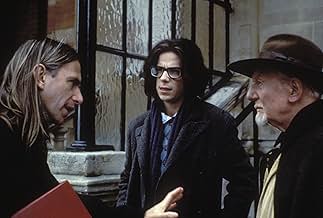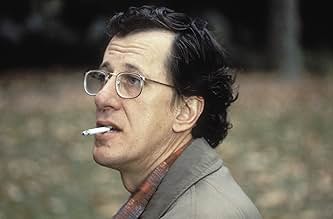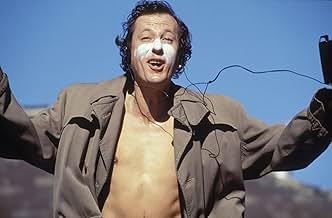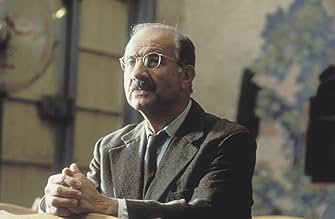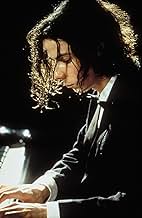IMDb-BEWERTUNG
7,6/10
58.120
IHRE BEWERTUNG
Von seinem Vater und seinen Lehrern unter Druck gesetzt, erleidet der Pianist David Helfgott einen Zusammenbruch. Jahre später kehrt er ans Klavier zurück und erlangt zwar nicht die Anerkenn... Alles lesenVon seinem Vater und seinen Lehrern unter Druck gesetzt, erleidet der Pianist David Helfgott einen Zusammenbruch. Jahre später kehrt er ans Klavier zurück und erlangt zwar nicht die Anerkennung der Kritiker, aber die des Publikums.Von seinem Vater und seinen Lehrern unter Druck gesetzt, erleidet der Pianist David Helfgott einen Zusammenbruch. Jahre später kehrt er ans Klavier zurück und erlangt zwar nicht die Anerkennung der Kritiker, aber die des Publikums.
- Regie
- Drehbuch
- Hauptbesetzung
- 1 Oscar gewonnen
- 46 Gewinne & 52 Nominierungen insgesamt
Empfohlene Bewertungen
This movie is definitely in my top five favorite movies of all time. It is unbelievably brilliant. Geoffrey Rush, dare I say, is perhaps the greatest actor of modern times. His performance alone is worth watching, let alone the outstanding supporting cast! Definitely not in typical Hollywood fashion, the movie is a truly great indie film. A must see for music lovers and indie film lovers alike.
Okay, so I did some reading after this driven by idle curiosity about the account. The real Helfgott didn't spend 15 years abandoned in a room with a piano, he didn't have to stand in the rain outside of a bar before they would let him in. He was pretty well known in the local scene as a pianist, his father was not a Holocaust survivor and David had been married before. Father and son were never really estranged and David was present at his funeral.
But just the same, the 'objective' point-of-view that purports to explain him, or any of us at any time based on a few facts, is in the end no less hypocritical than any attempt to pass dramatization as 'the real story'. This matters. Someone can be present at a funeral without being truly present, and someone can feel forgotten and alone even when they're factually surrounded by people, estranged from a parent even when formally this was never so.
The film is at a simple emotional level where the attempt to conquer a maddening complexity (music, life) snaps the tethers of mind and in due time the reconfiguring of this damage into blossoming art. The moral is that we must keep trying and hope for the best, perhaps the worthiest lesson even if it appears slightly trite in the context of a more or less happy ending.
Still, why feel the need to invent all those things, knowing you are doing so? When the violence inflicted on the son could be inferred by a more ambiguous tension instead of an outright beating.
Because, it seems, we can only choose to accept the lesson if at the center we find a good soul worthy of the saving. In other words, it is not the fact that he gives a great last recital that matters, but that he plays at all; not that a genius was salvaged because he might never have been that, but a human being. And this is what rankles so much Helfgott's critics who find him borderline incompetent in his playing - he is cheered on in concerts because he is the character from this film.
Ideally we would be able to discern all these points here instead of one harmony: the truly damaged but kind soul, the inability to place blame for that damage on any ogre father or Holocaust, and being able to somehow experience his music (the real Helfgott recorded for the film) as a trained ear would, fixated flourishes followed by distraction and incompetence according to critics, musically extending the damaged self.
For a more demanding film on the same subject of madness and transcendent musical genius see a little known film on a medieval composer called Death in Five Voices: all about the dissonance between different voices trying to harmonize a story and this carried in the music itself.
But just the same, the 'objective' point-of-view that purports to explain him, or any of us at any time based on a few facts, is in the end no less hypocritical than any attempt to pass dramatization as 'the real story'. This matters. Someone can be present at a funeral without being truly present, and someone can feel forgotten and alone even when they're factually surrounded by people, estranged from a parent even when formally this was never so.
The film is at a simple emotional level where the attempt to conquer a maddening complexity (music, life) snaps the tethers of mind and in due time the reconfiguring of this damage into blossoming art. The moral is that we must keep trying and hope for the best, perhaps the worthiest lesson even if it appears slightly trite in the context of a more or less happy ending.
Still, why feel the need to invent all those things, knowing you are doing so? When the violence inflicted on the son could be inferred by a more ambiguous tension instead of an outright beating.
Because, it seems, we can only choose to accept the lesson if at the center we find a good soul worthy of the saving. In other words, it is not the fact that he gives a great last recital that matters, but that he plays at all; not that a genius was salvaged because he might never have been that, but a human being. And this is what rankles so much Helfgott's critics who find him borderline incompetent in his playing - he is cheered on in concerts because he is the character from this film.
Ideally we would be able to discern all these points here instead of one harmony: the truly damaged but kind soul, the inability to place blame for that damage on any ogre father or Holocaust, and being able to somehow experience his music (the real Helfgott recorded for the film) as a trained ear would, fixated flourishes followed by distraction and incompetence according to critics, musically extending the damaged self.
For a more demanding film on the same subject of madness and transcendent musical genius see a little known film on a medieval composer called Death in Five Voices: all about the dissonance between different voices trying to harmonize a story and this carried in the music itself.
This is a good film in every sense but will mean most to fathers with strong views :).
The story of a brilliant young pianist whose relationship with his father drives him to some sort of mental illness. Watchable, absorbing, brilliantly edited, deeply seriously moving, one of the rare films that pays attention to incidental sound. Wonderful direction and acting. This is a seriously good film.
The story of a brilliant young pianist whose relationship with his father drives him to some sort of mental illness. Watchable, absorbing, brilliantly edited, deeply seriously moving, one of the rare films that pays attention to incidental sound. Wonderful direction and acting. This is a seriously good film.
I don't now why but when I first viewed this a few years back I did not care for it, but after watching it again I was very impressed. Maybe because I have grown more of an appreciation for classical music in that timeframe. I really don't understand how I could have missed the outstanding portrayal of the nuturing/stultifying father-son relationship, or the moving way that David can only express himself via the piano (notice how he speaks in virtually only apothems). This is a very great film.
David is a stuttering, rambling man having suffer a complete breakdown as a young man. However when he was a child his skills on the piano were unmatched. Driven by his father, opportunities open up in front of him to go abroad to learn, but his father denies him the chance. He leaves for London where he drives himself to the point of exhaustion before coming back home to find his father has disowned him.
It took me years to finally watch this film. I was still in Northern Ireland when it came out in the cinema and such films were not permitted to cross our borders, lest they keep the latest action movies from our 1 or 2 screen cinemas! So away from the hype and the Oscar hoopla I sat to watch this film and found myself easily taken in by it. The story is the true story of David Helfgott who was a boy genius before his breakdown. The film starts with him as an adult then jumps back to see him as a child. This approach works well to allow us to see the `end result' as it were, before we see what would be considered the causation factors. These factors are a little heart breaking to watch but they are very well delivered. As an adult, David is comic, warming and tragic. The pain in his life is brought out very well.
A great deal of the praise for this must lie with the wonderful cast. Rush got his Oscar of course and I'll leave it to the users on the message boards to argue over whether or not you can be the lead actor with screen time of less than half the film! He is great, walking a difficult line with a `disabled' character but managing not to just make it a caricature at any point. David as a child is very well played by Rafalowicz and does more of the development work than Rush and hence gets less credit than he deserves for making us care for the adult David. Mueller-Stahl is as good as he can be and gives a great performance, the only downside being that he doesn't age a single day between the adult and child sections of the story - surely some makeup could have been used?
Overall this is a very enjoyable human story that is driven by several really strong performances in key roles. The story keeps it's tone light but yet still manages to be dramatic and, in some scenes far too touching to avoid being slightly moved. The music is beautiful when it is called on to be and dramatic at other times - the director does very well to make the intense music translate into intense scenes in the film. Overall a simple story of a man but one that is interesting and a lot more moving that I expected it to be.
It took me years to finally watch this film. I was still in Northern Ireland when it came out in the cinema and such films were not permitted to cross our borders, lest they keep the latest action movies from our 1 or 2 screen cinemas! So away from the hype and the Oscar hoopla I sat to watch this film and found myself easily taken in by it. The story is the true story of David Helfgott who was a boy genius before his breakdown. The film starts with him as an adult then jumps back to see him as a child. This approach works well to allow us to see the `end result' as it were, before we see what would be considered the causation factors. These factors are a little heart breaking to watch but they are very well delivered. As an adult, David is comic, warming and tragic. The pain in his life is brought out very well.
A great deal of the praise for this must lie with the wonderful cast. Rush got his Oscar of course and I'll leave it to the users on the message boards to argue over whether or not you can be the lead actor with screen time of less than half the film! He is great, walking a difficult line with a `disabled' character but managing not to just make it a caricature at any point. David as a child is very well played by Rafalowicz and does more of the development work than Rush and hence gets less credit than he deserves for making us care for the adult David. Mueller-Stahl is as good as he can be and gives a great performance, the only downside being that he doesn't age a single day between the adult and child sections of the story - surely some makeup could have been used?
Overall this is a very enjoyable human story that is driven by several really strong performances in key roles. The story keeps it's tone light but yet still manages to be dramatic and, in some scenes far too touching to avoid being slightly moved. The music is beautiful when it is called on to be and dramatic at other times - the director does very well to make the intense music translate into intense scenes in the film. Overall a simple story of a man but one that is interesting and a lot more moving that I expected it to be.
Wusstest du schon
- WissenswertesGeoffrey Rush had once learned the piano up until aged fourteen. He took up piano lessons again thirty years later for this movie and also acted as his own hand double and body double.
- PatzerThe character shows all signs of schizophrenia; not bipolar disorder (formerly known as "manic-depressive disorder"), as is claimed in the film. The real David Helfgott likewise displays many symptoms of schizophrenia and none of bipolar disorder.
- Zitate
Cecil Parkes: You must play as if there's no tomorrow.
- Crazy CreditsHimself: hand double for Geoffrey Rush
- SoundtracksWith A Girl Like You
Written by Reg Presley
© 1966 Dick James Music Limited
Performed by The Troggs
© 1966 Mercury Ltd. London
Top-Auswahl
Melde dich zum Bewerten an und greife auf die Watchlist für personalisierte Empfehlungen zu.
Details
- Erscheinungsdatum
- Herkunftsland
- Offizielle Standorte
- Sprachen
- Auch bekannt als
- Shine
- Drehorte
- Produktionsfirmen
- Weitere beteiligte Unternehmen bei IMDbPro anzeigen
Box Office
- Budget
- 5.500.000 $ (geschätzt)
- Bruttoertrag in den USA und Kanada
- 35.892.330 $
- Eröffnungswochenende in den USA und in Kanada
- 162.179 $
- 24. Nov. 1996
- Weltweiter Bruttoertrag
- 35.999.121 $
- Laufzeit1 Stunde 45 Minuten
- Farbe
- Sound-Mix
- Seitenverhältnis
- 1.85 : 1
Zu dieser Seite beitragen
Bearbeitung vorschlagen oder fehlenden Inhalt hinzufügen

Oberste Lücke
By what name was Shine - Der Weg ins Licht (1996) officially released in India in Hindi?
Antwort



